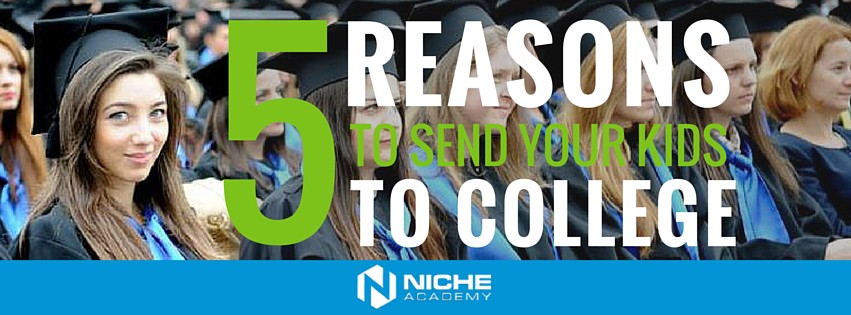This is the companion post to my earlier “5 reasons NOT to send your kids to college”. It’s organized around a set of data points that point to a different basic decision than my earlier post. Call me fickle, but I see it building on, more than contradicting the observations in that earlier post. Here are the top 5 reasons I probably will still send my kids to college.
1. There are Still a Number of Professions That Require a College Credential.
If your child wants to be a doctor, a lawyer, a teacher, a psychologist, or an accountant, for example, a college degree is simply required. No way around it at this point in time.
I would expect to see, in the next decade or so, that alternative kinds of credentialing will emerge for the needs these professions fill. Nurse practitioners, paralegals, and hygienists now perform many of the routine services of doctors, lawyers, and dentists. I expect that less expensive alternative kinds of credentialing will work their way into the system and push the function of the 6-12 year degree crowd further into the high end of the market.
But for now, a degree is still the only ticket into many professions.
2. There are Degree Programs That Do Make Economic Sense.
The 4 year state college nearest to me costs about $2,700 a semester in tuition and fees. If a student took 9 semesters to finish a chemistry degree, they’d be out about $25,000. A friend of mine who teaches college Chemistry reports an average starting salary for Chemistry graduates in Utah around $52,000. A Forbes article from 2013 corroborates this.
So if you have a child who is more practical than I was at 18, they might very well pay off their student loans in short order and get on with their middle class American Dream.
3. There are College Experiences That Can Spark a Love of Learning.
These experiences sometimes begin with a teacher that knows how to ask questions and ignite new ideas.
They may emerge from the mix of personalities and backgrounds in a dorm room debate or a classroom discussion. In almost every case, they involve a life-altering awareness of how little you know, and how much you want to know.
Maybe not everyone who goes to college has these transformative moments of intellectual awakening. For me, though, they happened in the social and intellectual context of a college campus. I would send my kids to college on the hope that they might experience something similar.
4. Grit, Confidence, & the Ability to Learn
There is still something in the program of a 4 year degree that, if completed, bestows an ability to learn and a confidence in your capacity to learn. Maybe the length of the commitment it requires helps to foster grit. Maybe the supportive social context of other students similarly engaged is a key element.
In a recent and persuasive NY Times article, David Leonhardt argues it’s a bit of both. In a technology-driven and rapidly changing world, the ability to learn and adapt is the best, no, it’s the only real job security.
5. Continuing Education
Finally, and maybe this is just a restatement of #4, continuing education has never been more available.
A college degree doesn’t lock you into a particular career path the way it once did. The explosive growth in online learning options over the last few years makes it possible to re-tool and reinvent yourself. It’s easier than ever to switch career tracks.
Rightly seen, a college degree may be simply the first course in a lifetime of self-directed education. Niche Academy believes that effective libraries are focused on providing opportunities for self-directed education. We believe that library education is an essential tool for a competitive workforce in the 21st century.


